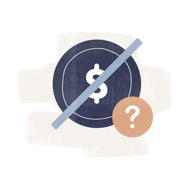Taking out a loan is often a necessary action for owners looking to grow a successful business. However, many business owners engaging in the loan hunt don’t realize there are a variety of underlying fees and charges rolled into the final loan, which is why it’s important to get out that magnifying glass and read the business loan small print.
Loans advertised with an annual percentage rate (APR) should give you the total cost of the loan, including the interest rate and other standard fees. However, if the loan is only advertised with an interest rate, or other rate specified by a lender, you’ll likely encounter additional costs. Understanding these extras can help you compare offers from lender to lender; it may also help you vie for a lower loan rate.
Some of these fees are non-negotiable and simply part of the loan agreement. Some of these won’t be included in an APR, but will still affect your costs. In any case, it’s important to watch out for these business loan fees before you sign on the dotted line.
1. Origination Fee
This fee is pretty common, and is meant to recoup the labor that goes into things like paperwork, verifications, underwriting, and any other process required for the lender to approve your loan and get the money in your hands.
Origination fees are typically charged upfront, with the amount subtracted from your loan before it’s disbursed. These fees are commonly between 1% to 4% of your total loan amount, which might not sound like much, but it can eat into your capital, big time.
The good news is that in some cases, this fee is negotiable. If you have good credit or multiple lenders competing for your business, you’ll likely have more leverage to reduce the fee.
2. Third-Party Fees
Depending on your loan purpose (commercial real estate, for example), you may find fees from third parties—such as appraisers and notaries, as well as for documentation requirements—added to your business loan fees.
Talk to your lender and ask which, if any, of these fees may be included. Due to the nature of these fees, there is no set rate amount, but it’s likely that at least some of them can be negotiated or reduced.
Ultimately, these may not seem significant at the time of signing. However, they’re either deducted from your loan or added to your total loan amount, and therefore can increase your costs.
3. Prepayment Penalties
The concept of paying off your loan early might seem appealing, but for lenders, that leads to a potential loss in the interest they originally anticipated receiving at the disbursement of your loan. For that reason, some lenders take action to protect themselves against this loss by charging the borrower a percentage or flat fee if they attempt to pay the loan off early.
The fee varies from lender to lender, but it’s something you should determine early in the application process. It’s likely that once you sign, you’re locked in to whatever repayment or redemption charge was listed in the business loan small print, so your best bet at catching this fee is to inquire upfront and read any and all documentation. Note that because you only incur this fee if you prepay a loan that carries this penalty, an advertised APR typically wouldn’t reflect this cost.
4. Check Processing Fee
Some businesses and lenders may incentivize you to have your loan payments automatically deducted from your account, but others take a different path and pass it on as a business loan fee—penalizing you for not doing so.
Much like the prepayment fee, this will vary in structure and cost, and will not be reflected in an advertised APR. If you prefer to pay by check, ask your lender what, if any, payment-processing fees exist.
5. Guarantee Fee
Loans backed by the Small Business Administration (SBA) will be subject to a guarantee fee, meaning a fee that is charged to the lending bank to guarantee that they’ll recoup some of the cost if the borrower defaults. It’s likely that the bank will pass a portion of the cost along to you, but the amount passed on from the lender to the borrower may vary, according to the SBA website. SBA loans under $150,000 are not subject to this particular fee.
The rate is based on the maturity and the guaranteed loan amount: For loans greater than $150,000 with a maturity of one year or shorter, the fee is 0.25% of the guaranteed amount. Loans between $150,000 and $700,000 with a maturity of over one year are subject to a 3% guarantee fee, and loans exceeding $700,000 have a 3.5% guarantee fee. The good news is that even though interest and fees are determined by the lender, SBA backed loan rates may not exceed the maximums set by the SBA. All of this can be a little difficult to figure out on your own, so be sure to ask your lender for an explanation of how your fee is calculated.
Ultimately, the burden is on the borrower to find out what fees they’ll have to pay, and as such, be sure to read all business loan small print, ask questions, and demand explanations for any fee. If you aren’t sure whether a fee is normal or if you can negotiate it, do your research. In the worst-case scenario, they simply can’t adjust the fees. However, empowering yourself with this information can help you negotiate lower rates and make the best decision if choosing between multiple lenders.
More answers to pressing questions
What You Need to Know About SBA Loans
How to Shop for a Business Loan Without Hurting Your Credit Scores
This article was originally written on October 27, 2016 and updated on January 29, 2017.


Have at it! We'd love to hear from you and encourage a lively discussion among our users. Please help us keep our site clean and protect yourself. Refrain from posting overtly promotional content, and avoid disclosing personal information such as bank account or phone numbers.
Reviews Disclosure: The responses below are not provided or commissioned by the credit card, financing and service companies that appear on this site. Responses have not been reviewed, approved or otherwise endorsed by the credit card, financing and service companies and it is not their responsibility to ensure all posts and/or questions are answered.